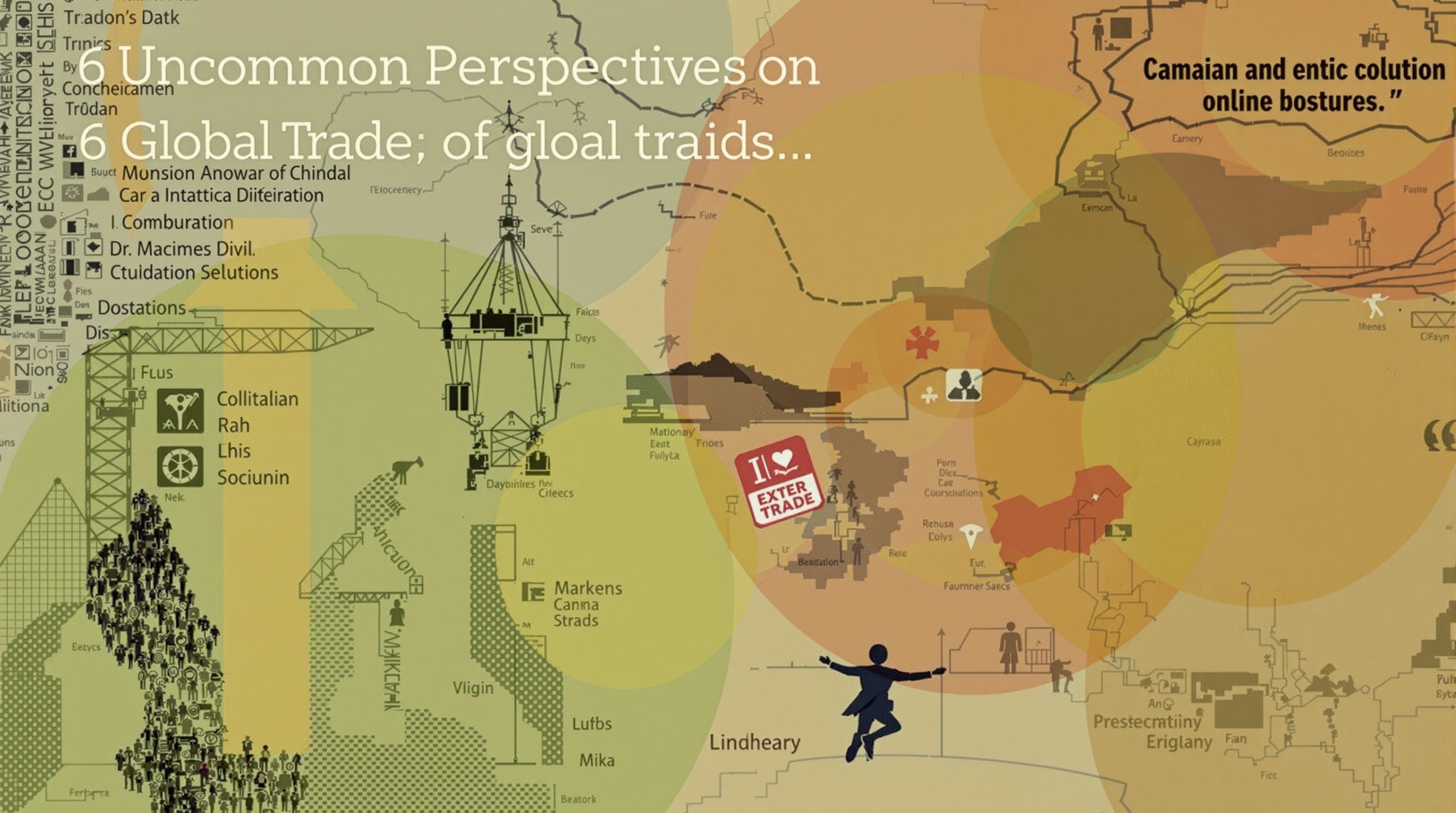Related Articles
- When Ancient Trade Routes Resurface: Unexpected Lessons for Modern Commerce and Global Economic Resilience
- When Artifacts Become Currencies: The Intriguing Trade Between Antiquities and Emerging Markets
- Beyond Borders: Unconventional Partnerships Transforming Trade Strategies in the Age of Globalization
- The Rise of Shadow Economies: How Informal Trade Networks are Disrupting Global Market Structures
- Cryptocurrency and Society: Understanding the Hidden Costs of Digital Assets on Community Well-Being
- The Surprising Role of Cultural Narratives in Shaping Investment Choices and Financial Preferences
9 Hidden Opportunities in Global Trade: 9 Untapped Markets and Trends for Innovative Strategists Looking to Expand Horizons
9 Hidden Opportunities in Global Trade: 9 Untapped Markets and Trends for Innovative Strategists Looking to Expand Horizons
9 Hidden Opportunities in Global Trade: 9 Untapped Markets and Trends for Innovative Strategists Looking to Expand Horizons
1. Emerging Technologies in Logistics
The logistics sector is undergoing a significant transformation driven by emerging technologies. Innovations such as blockchain, IoT, and AI are streamlining supply chains, enhancing transparency, and reducing costs. Businesses that adopt these technologies can optimize their operations and gain a competitive edge. For instance, blockchain ensures traceability in shipping, which can reassure customers about product authenticity.
Moreover, AI-powered analytics predict customer demand, enabling companies to manage inventory more effectively. As e-commerce escalates, the need for efficient logistics solutions grows. Companies that invest in smart logistics infrastructure are positioned to seize these opportunities and serve global markets more efficiently.
As economies become increasingly interconnected, the enhancement of logistical operations offers not only cost savings but also facilitates entry into new markets. Understanding and utilizing these innovations can lead to substantial improvements in reach and profitability.
2. The Rise of Eco-Conscious Consumerism
With growing awareness of environmental issues, eco-conscious consumerism presents a vast opportunity for businesses. Consumers across the globe are increasingly prioritizing sustainability in their purchasing decisions. This shift is driving demand for products that are ethically sourced and environmentally friendly. Companies that respond to this trend can cultivate customer loyalty and expand their market base.
Investing in sustainable practices not only meets consumer demand but also provides a competitive advantage. Brands that transparently communicate their sustainable initiatives often see a boost in their reputation and sales. Additionally, regulatory changes worldwide are pushing businesses to adopt greener practices, creating both challenges and opportunities.
Engaging with eco-conscious strategies allows companies to appeal to a growing demographic of environmentally focused consumers. Establishing a reputation as a sustainable brand can foster lasting relationships with customers in the long term.
3. Medical Tourism Growth
Medical tourism is on the rise, fueled by the global demand for high-quality healthcare services at reasonable prices. Patients are increasingly traveling abroad to seek treatments, surgical procedures, and wellness therapies that may be prohibitively expensive or inaccessible in their home countries. Countries like Thailand, India, and Turkey have emerged as popular destinations due to their affordable healthcare options.
Strategists can capitalize on this trend by establishing partnerships with medical institutions and travel agencies, creating a seamless experience for patients. The combination of travel and health services can provide a lucrative avenue for growth while catering to an evolving consumer need.
Moreover, digital health technologies and platforms also play a crucial role in this space, making it easier for patients to research, evaluate, and choose medical services overseas. Building strong, trustworthy networks within the medical tourism field can unlock new markets and revenue streams.
4. Remote Work and Global Talent
The COVID-19 pandemic has permanently altered workplace dynamics, intensifying the trend towards remote work. This shift has opened up access to global talent pools, enabling companies to hire skilled employees from anywhere in the world. Organizations that embrace this model can leverage diverse perspectives and skills that enhance innovation and creativity.
Furthermore, businesses can reduce operational costs by hiring remotely, often benefiting from lower labor costs in emerging economies. This can lead to an increase in profitability while simultaneously supporting local economies in those regions.
As remote work continues to evolve, developing effective management strategies for distributed teams becomes imperative. Companies targeting global talent can create a work culture that embraces diversity and inclusivity, setting themselves apart in competitive markets.
5. E-commerce Expansion in Underserved Markets
Though e-commerce has flourished in developed countries, there are vast opportunities in underserved markets where internet penetration and digital payment systems are still developing. Regions in Sub-Saharan Africa and parts of Southeast Asia present untapped opportunities for e-commerce giants and start-ups alike.
Companies that understand local consumer behaviors and preferences can tailor their offerings to meet specific needs, thus gaining a loyal customer base. Additionally, investing in local partnerships can enhance logistics and delivery systems, making services more accessible in these areas.
The expansion into underserved markets not only addresses consumer needs but also contributes to local economic growth. Innovative approaches to delivering services and products can meet emerging demands and build sustainable business models in these regions.
6. Agri-tech Solutions for Food Security
Many regions worldwide face food security challenges exacerbated by climate change, population growth, and resource constraints. Agri-tech offers innovative solutions to improve crop yields, reduce waste, and enhance food distribution. Strategies involving precision agriculture, biotechnology, and sustainable farming practices can transform food systems.
Companies involved in agri-tech can tap into markets by providing tools and technologies that empower farmers to increase productivity while minimizing environmental impact. This presents an opportunity to address global food shortages and enhance food sustainability.
Moreover, partnering with governments and NGOs focused on food security initiatives can open new avenues for innovation in agri-tech. Expanding in this sector not only meets pressing global needs but also has the potential for high returns on investment.
7. Cultural Exchange and Creative Industries
Globalization has facilitated cultural exchange, inspiring creative industries like cinema, fashion, and culinary arts. As societies become increasingly interconnected, there’s a tremendous opportunity for businesses to innovate by incorporating diverse cultural elements into their products and services.
Creative industries benefit from collaboration, allowing artists and creators from different backgrounds to produce unique, diverse content that resonates with global audiences. Companies that embrace cultural diversity can enhance their market appeal and foster consumer engagement.
By investing in cultural exchange initiatives or supporting local artists, businesses can create a sustainable impact while broadening their market reach. Understanding and promoting diverse cultural narratives can serve as a powerful branding strategy that attracts a wider customer base.
8. Digital Currency and FinTech Innovations
The rapid rise of digital currencies and fintech innovations is reshaping the financial landscape. With blockchain technology, businesses can explore opportunities in cryptocurrencies, decentralized finance, and secure transaction methods. This offers a chance for anyone willing to invest time in understanding digital currencies and the related regulatory environment.
Fintech solutions are making financial services more accessible to underserved populations, driving inclusion and opening new markets. Innovations like mobile banking and peer-to-peer lending platforms can significantly expand financial services in emerging economies.
Companies that adapt to and leverage these new financial technologies can enhance transaction efficiencies, reduce costs, and serve more customers in a rapidly evolving economic landscape. Engaging with the digital finance ecosystem can result in unique business opportunities globally.
9. Health and Wellness Market Growth
The global health and wellness industry is witnessing unprecedented growth, driven by consumer awareness and the increasing importance of physical and mental well-being. From fitness apps and healthy food options to mental health services, there is an expansive range of opportunities for businesses to explore.
Innovative strategists can tap into niche markets within health and wellness, such as digital mental health solutions, personalized nutrition, and alternative therapies. As people continue to prioritize their health, the demand for diverse solutions offers a lucrative avenue for growth.
Furthermore, creating partnerships with healthcare professionals can enhance product credibility and visibility in the market. By addressing the evolving health needs of consumers, companies can establish themselves as leaders in the burgeoning health and wellness sector.




